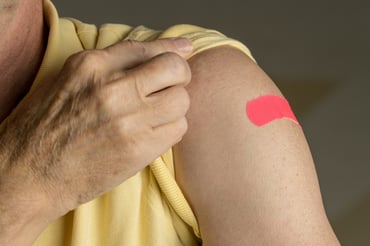
When you were being treated for cancer, you may have experienced loss of appetite, changes to your senses of taste and smell, and bouts of nausea. Eating regularly while you were going through treatment may have felt more like a chore. But now, as a cancer survivor, you’re likely to regain your appetite.
It’s important to be mindful of what and how much you’re eating as you get back into a more regular routine. Some survivors are looking to regain after losing too much weight while other survivors may want to maintain or even lose a few pounds after treatment. Using the end of cancer treatment as a fresh start, it’s a good time to focus on practicing healthy eating habits.
1. Eat Smaller, More Frequent Meals
If you need to gain weight, you may not have the appetite for a large dinner or breakfast. Instead, meet your calorie goals by snacking on healthy foods throughout the day. Breakfast could be a hard-boiled egg, followed by a mid-morning banana, followed by a scoop of tuna salad for lunch, etc. This approach can also help you avoid overeating if you need to lose weight.
2. Try Different Protein Sources
Proteins are the building blocks of life and an important part of any healthy eating routine. Proteins help build muscle mass and repair and build new cells. Because proteins also take longer to digest, after you eat them you’ll feel full longer and be less likely to crave unhealthy snacks. Variety is the spice of life, and fortunately, you can get your protein through a variety of foods, including red meat, fish, eggs, tofu, nuts, beans, and cheese.
3. Avoid Empty Calories
You may need to consume more calories to gain weight, but not all calories are equal. Sugars and saturated fats have high-calorie counts, but they can have negative health implications, as studies repeatedly conclude. Avoid eating too many processed foods, starches, sweets, and sodas.
Read More about Alcohol After Cancer
4. Don’t Forget About Fiber
Most people know that dietary fiber is beneficial in preventing and relieving constipation. It also helps lower cholesterol and controls blood sugar levels. Because high-fiber foods are less energy dense than other foods, they have fewer calories than the same amount of low-fiber foods. And, because they’re more filling than low-fiber foods, you’ll feel fuller longer after you eat them. Fruits like apples and oranges, vegetables like cauliflower and green beans, whole grains like oats and wheat bran, and legumes are healthy high-fiber foods.
5. Use Seasonings
If you’re still experiencing long-term treatment side effects that make eating unpleasant (such as nausea or taste changes), make food more appealing by seasoning it. Lemon juice, cinnamon, garlic, dill, rosemary, are just a few examples of healthy spices that can make bland food more flavorful. While salt is a seasoning, it’s important to monitor the amount of salt you use each day for your heart health.
6. Try Different Food Preparations
Vegetables are an important part of a healthy diet. If you’re used to eating them one way and don’t particularly like them, experiment with other ways to prepare them. Veggies can be eaten crunchy and raw with a healthy dip, such as seasoned Greek yogurt, steamed and topped with cheese, or diced up and incorporated into soups, meatloaf, omelets, etc. Additionally, steaming, baking, and broiling meats or fish are much healthier options than frying or sautéing them.
7. Eat the Rainbow
The colors of fruits and vegetables represent different nutrients that our bodies need. Choose fresh produce in a variety of colors, such as dark leafy greens, deep-yellow squash, oranges, red peppers, etc.
8. Shop the Perimeter
The healthiest foods are fresh foods. When you’re at the grocery store, most of your items should come from parts of the store typically along the outside edge. This is typically the produce section, meat and seafood counters, and dairy aisle. Avoid processed foods that usually come in cans, bags, and boxes.
9. Take Advantage of Oncology Nutrition Services
Sometimes, making the right nutritional choices can be challenging. That’s understandable. If you’re struggling with healthy eating and you’re located in the Portland-Vancouver area, we encourage you to contact us at Compass Oncology.
Our in-house dietitian, who focuses specifically on the needs of cancer patients and survivors, is available to help with advice, recipes, menus, and more to get you on the right track. She’ll also help you determine whether nutritional supplements are appropriate for you, and, if they are, make sure they’re safe to take with any medications you’re still taking.



